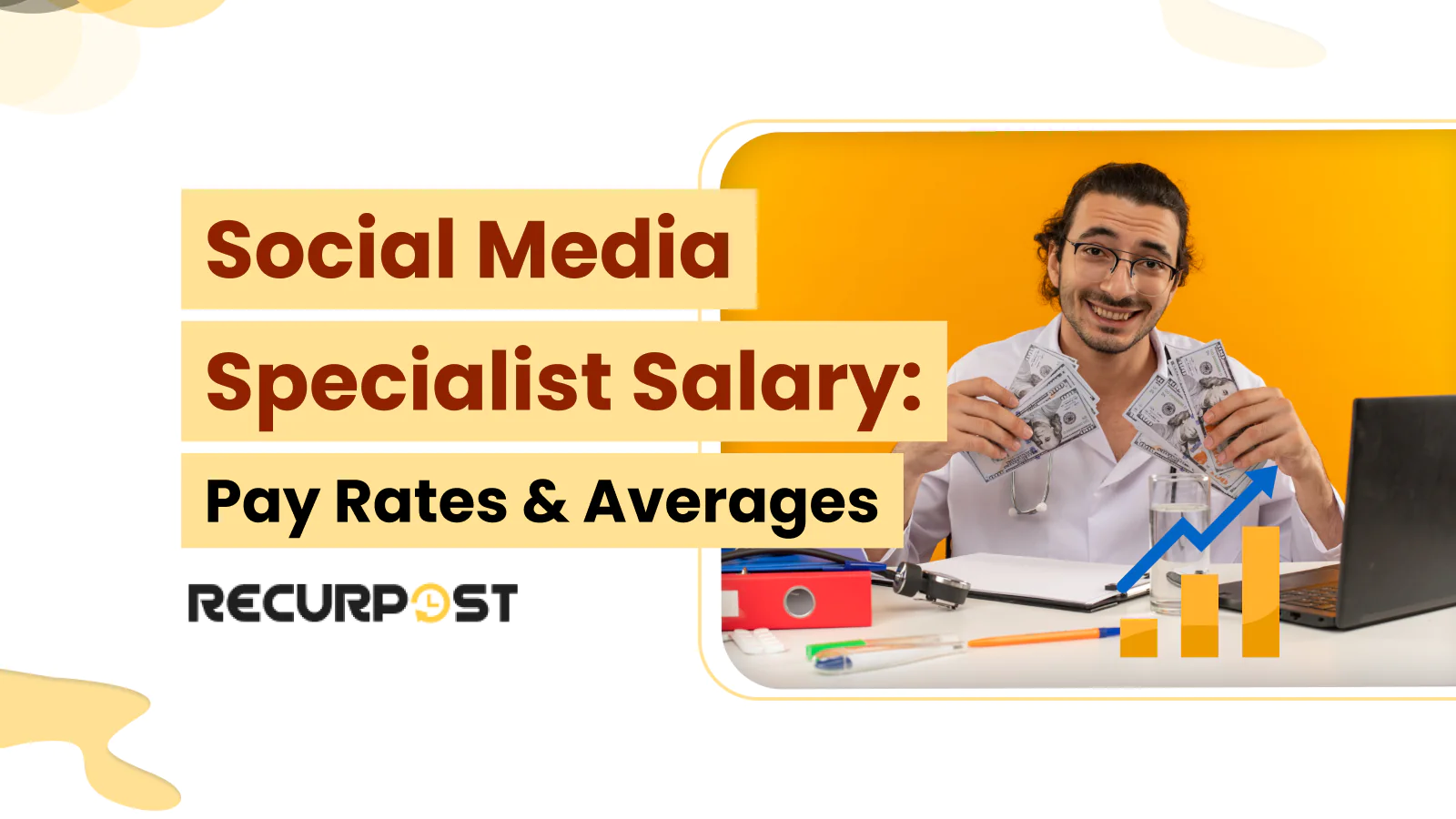Ever wonder if those hours spent on Instagram, Twitter, and TikTok could actually pay off? Good news, they can. And not just a little.
Social media specialists in 2026 are making about 12% more than traditional marketing pros. That’s not a small gap. It’s a sign of how the game has changed. Brands aren’t just advertising online anymore, they’re living there. And they need people who know how to speak the internet’s language.
Since 2023, this job has grown fast about 18% in just two years. Companies are hiring social media specialists like never before. The shift to digital-first strategies after the pandemic didn’t slow down. It sped up. Now, if you know how to build a community online or turn a trend into traffic, you’re in high demand.
So, what does the paycheck look like? That’s what we’re getting into next.
TL;DR: Social Media Specialist Salary in 2026
- Social media specialists earn 12% more than traditional marketers in 2025
- U.S. salaries range from $40,000 to $68,000, with Glassdoor averaging $64,521
- Pay grows with experience: from $43,971 for entry-level to $72,955 for experts
- Big companies and industries like tech and luxury goods offer higher salaries
- Benefits and bonuses can add 20% or more to base pay
- Skills in AI, analytics, and content strategy lead to bigger paychecks
- Degree holders and people with journalism or design backgrounds often earn more
- Remote work is reducing location-based pay gaps, but cities still pay 15–30% more
- Freelancers can earn $25 to $100 per hour with the right portfolio
- The best time to negotiate pay is during annual reviews or job switches
- Trends show growing demand for short-form video and AI-driven content
- Businesses should benchmark salaries and support career growth to retain talent
Current Salary Landscape for Social Media Specialists (2026)
So, how much does a social media specialist earn in 2026? Let’s look at the numbers.
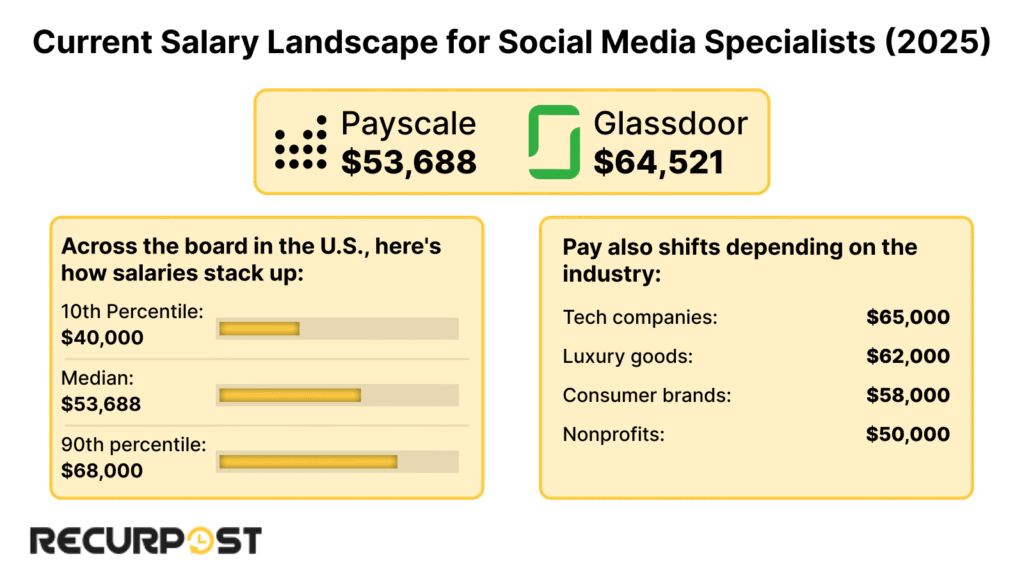
On PayScale, the average salary of a social media specialist sits at $53,688. That includes a range from around $40,000 to $68,000. Over on Glassdoor, it’s a bit higher, $64,521 on average.
Across the board in the U.S., here’s how salaries stack up:
- 10th percentile: $40,000
- Median: $53,688
- 90th percentile: $68,000
Larger companies pay social media specialists more than small or mid-sized businesses due to bigger budgets, broader audiences, and increased management responsibilities.
Pay also shifts depending on the industry:
- Tech companies: around $65,000
- Luxury goods: about $62,000
- Consumer brands: roughly $58,000
- Nonprofits: closer to $50,000
Tip: Comparing salaries from multiple sources like Glassdoor, PayScale, and LinkedInJobs provides a more accurate picture of market value.
For more insights into managing a team and making smart salary decisions, check out this article about social media team structures.
Salary Breakdown by Experience Level
Experience directly affects social media specialist salaries, with clear progression through career stages.
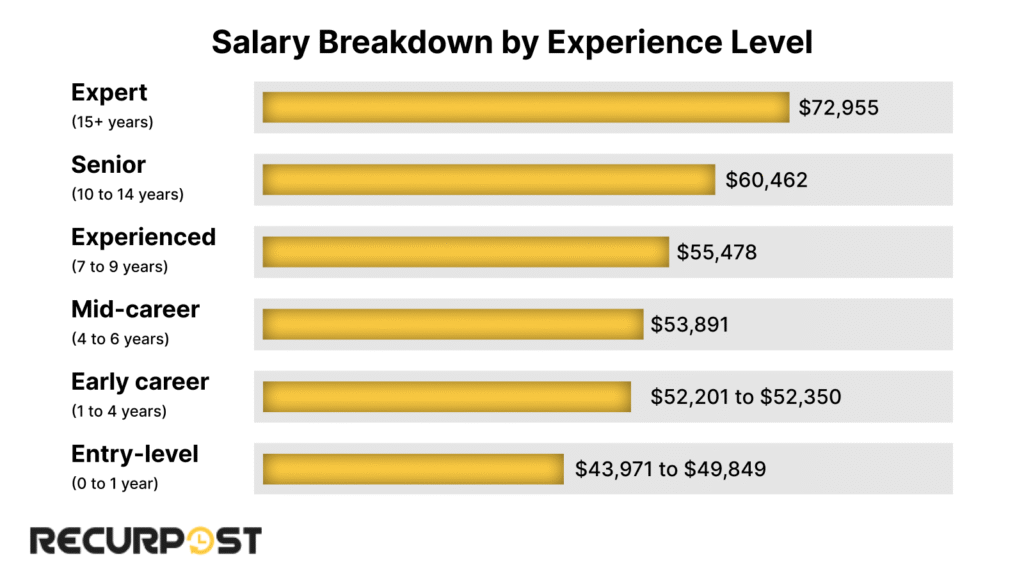
- Entry-level (0 to 1 year)
$43,971 to $49,849: that’s about 13 percent growth over the past couple of years.
- Early career (1 to 4 years)
$52,201 to $52,350: steady growth around 4 percent.
- Mid-career (4 to 6 years)
$53,891: about a 3 percent bump from early roles.
- Experienced (7 to 9 years)
$55,478: another 3 percent lift.
- Senior (10 to 14 years)
$60,462: Salaries rise by 9 percent at this level.
- Expert (15+ years)
$72,955: The jump is real here, with a 21 percent increase.
If you’re starting out, the average hourly rate is around $24.80, assuming a 40-hour workweek.
Social media specialists typically advance every 1 to 3 years based on performance and organization size. Entry-level specialists handle daily posts, scheduling, and community engagement. Mid-career professionals focus on analytics, content planning, and paid ads management. Senior specialists lead teams, set strategic direction, and manage major campaigns.
Want to understand how freelancing compares to full-time roles? Check out this guide on how to become a freelance social media manager.
Compensation Package Components
When people talk about the social media specialist salary, they often focus only on base pay. But there’s more to it than that.
For most full-time roles, base salary makes up about 80 percent of the total compensation. The rest comes from extras like benefits, bonuses, and sometimes equity.
Here’s what the other 20 percent usually includes:
- Healthcare coverage
- Retirement plans (401(k), company match)
- Learning budgets for courses, certifications, and events
These benefits usually add up to 10 to 20 percent of your full package.
In startups, it’s common to see equity and profit-sharing. These won’t show up in your monthly pay, but they can be a nice bonus if the company grows or gets acquired.
Performance bonuses are also part of the deal in many roles. These usually range from 5 to 20 percent and are tied to hitting goals like follower growth, engagement rates, or campaign ROI.
Want to make sure you’re getting a good deal? Look at the whole package, not just the number on your offer letter.
Impact of Skills on Salary
What you know matters. And for a social media specialist, the right skills can mean a bigger paycheck.
AI prompt engineering skills increase social media specialist salaries by 15 percent. Advanced analytics and ROI tracking add approximately 10 percent to base compensation.
Here’s a breakdown of how different skill sets affect your salary:
- Social Media Optimization: $53,111
- Content Management: $51,325
- Social Media Marketing: $51,189
- Marketing Communications: $50,790
- Copywriting: $50,520
These differences might not seem huge on their own, but when you combine them, the boost stacks up. For example, someone who handles paid ads, knows their way around analytics, and can write prompts for AI tools often earns a lot more than someone who sticks to just publishing posts.
Certifications help too. A Facebook Blueprint cert can add 8 percent to your salary. Google Analytics? About 7 percent.
So if you’re thinking about where to invest your time, think about skills that show a clear business impact. They pay off.
Education and Background Influence
Degree holders earn 10 to 15 percent more than non-degree holders in social media specialist positions.
But it’s not just about school. Your background plays a role too. People who switch into social media specialist jobs from areas like journalism, design, or branding usually earn more early on. That’s because they already bring solid skills in writing, visuals, and audience connection.
If you’ve worked in a related role before, like copywriting, customer support, or email marketing, you’re likely to start at a higher salary than someone totally new. Employers look for past experience that shows you can understand brands and talk to online audiences.
In short, the more relevant experience you bring to the table, the better your paycheck from day one.
Regional Salary Variations
Where you live or used to live still matters. But not as much as it used to, thanks to remote work. That said, social media specialist salary figures still shift quite a bit depending on location.
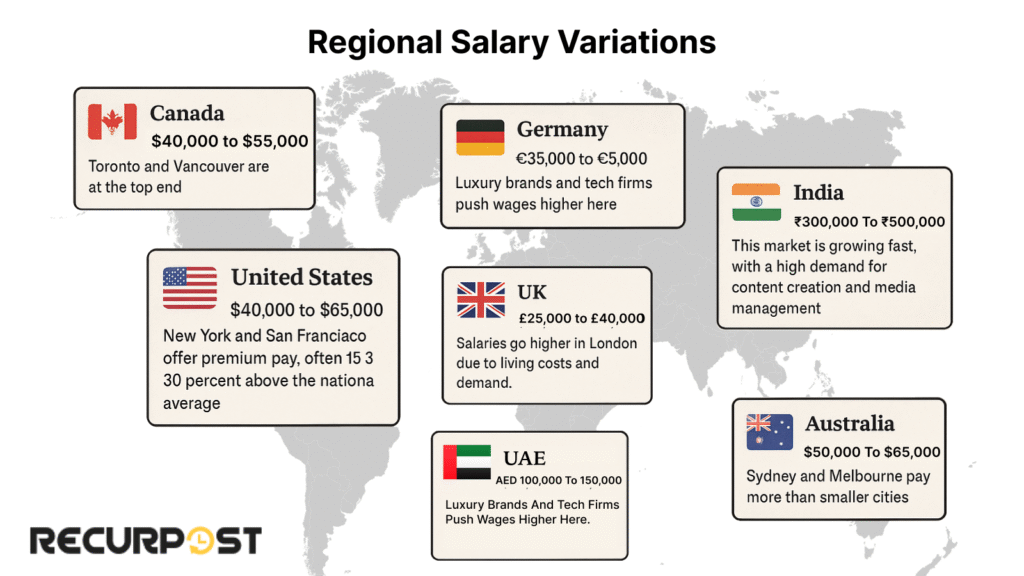
Here’s a quick look at what you can expect:
- United States: $40,000 to $65,000. Cities like New York and San Francisco offer premium pay, often 15 to 30 percent above the national average.
- UK: £25,000 to £40,000. Salaries go higher in London due to living costs and demand.
- Canada: CAD $40,000 to $55,000. Toronto and Vancouver are at the top end.
- Australia: AUD $50,000 to $65,000. Sydney and Melbourne pay more than smaller cities.
- India: ₹300,000 to ₹500,000. This market is growing fast, with a high demand for content creation and social media management.
- Germany: €35,000 to €50,000. Salaries are higher in Berlin and Munich.
- UAE: AED 100,000 to 150,000. Luxury brands and tech firms push wages higher here.
Remote jobs are starting to even things out, though. Many companies now pay based on role and skill rather than zip code. But taxes still vary, and they can impact your actual take-home pay. That’s something to check before accepting an offer from a company based in another country.
Comparative Salary Analysis
Social media specialists follow a career progression from Specialist to Manager to Director, with each advancement increasing responsibilities and compensation.
But not everyone wants to climb straight up. You can also shift sideways into roles like Digital Marketing Specialist or Content Manager, especially if you enjoy SEO, writing, or broader campaign work.
Your salary can also depend on where you focus. A media specialist working with LinkedIn might earn less than someone running full campaigns on TikTok. That’s because TikTok roles often require short-form video production and trend tracking, which can be more time-sensitive and creative.
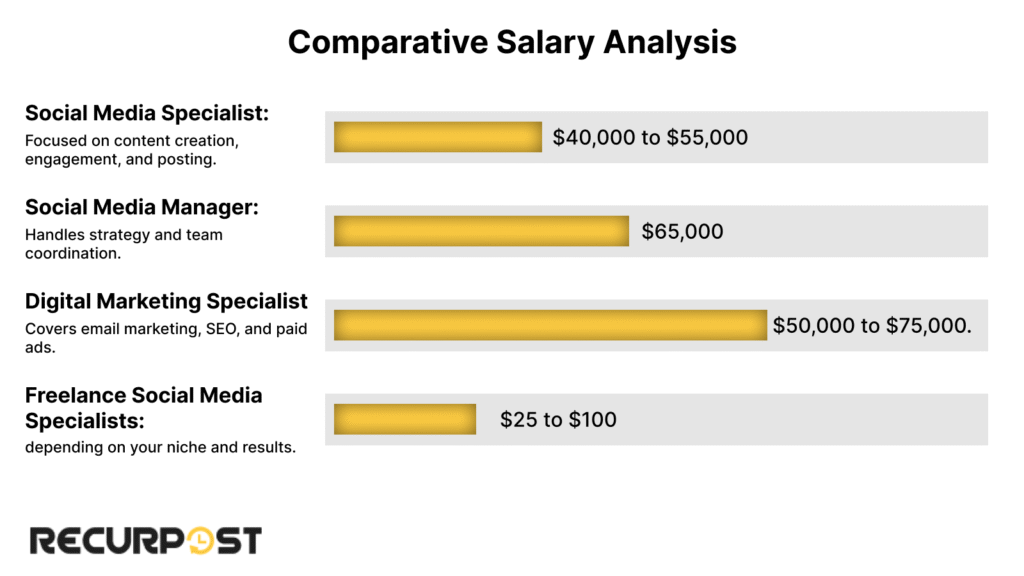
Here’s how the pay compares:
- Social Media Specialist: $40,000 to $55,000. Focused on content creation, engagement, and posting.
- Social Media Manager: Starts around $65,000. Handles strategy and team coordination.
- Digital Marketing Specialist: $50,000 to $75,000. Covers email marketing, SEO, and paid ads.
- Freelance Social Media Specialists: $25 to $100 per hour, depending on your niche and results.
If you’re freelancing, building a portfolio makes a big difference. It helps you stand out, just like a good resume would in a traditional job.
Negotiation Strategies
As a social media marketing specialist, knowing your value is one thing. Asking for it is another. That’s where smart negotiation comes in.
Using salary benchmarks from Glassdoor, PayScale, and LinkedIn strengthens negotiation positions by providing city-specific, industry-specific, and experience-level salary data from reliable sources.
Next, show results. If you’ve helped increase community engagement, grown follower counts, improved lead generation, or boosted ad performance, use those numbers. Employers pay more when they can see your direct impact.
Good KPIs to bring up:
To learn more about how to measure social media success, review the key performance indicators below:
- Follower growth percentage
- Engagement rate improvements
- Ad conversion rates
- Cost per lead
- Reach and impressions growth
Timing matters too. The best moments to negotiate are during annual reviews, after a successful campaign, or when you’re changing jobs. If you’re offered a new role, don’t accept on the spot. Ask for time, review the package, and come back with your counter.
Remember, people who ask tend to get more.
Future Salary Trends
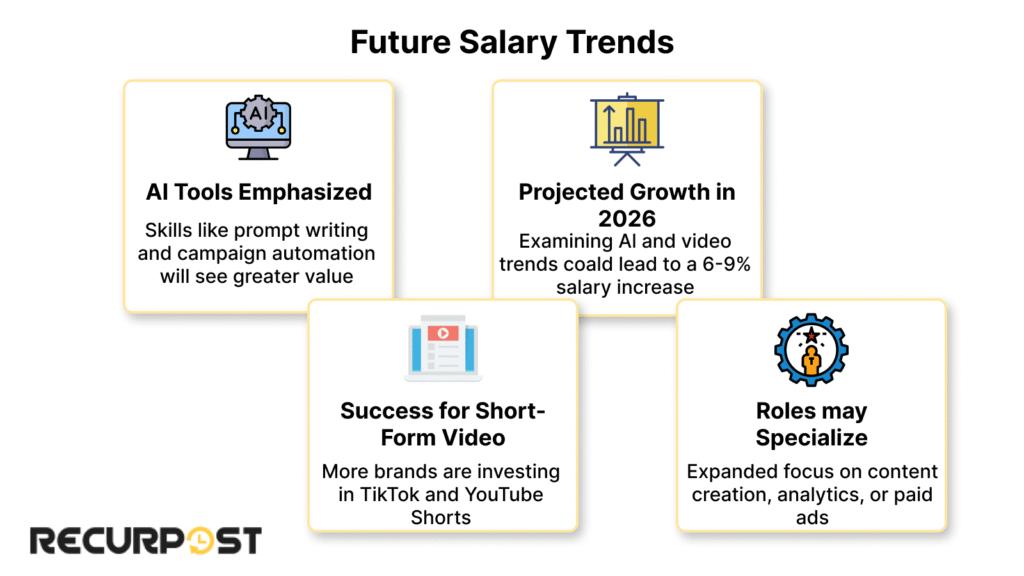
The job is changing fast. And so is the social media specialist’s salary.
With AI now baked into everyday tools, there’s more pressure on specialists to do more than schedule posts. Skills like AI prompt writing, campaign automation, and data cleanup are getting more valuable. If you can use AI to write smarter, analyze faster, or target better, you’re already ahead of the pack.
Platform shifts are happening too. Some channels are pulling ahead while others are losing ground. More brands are putting money into TikTok and YouTube Shorts. That means if you’re good at short-form video creation, editing, or scripting, you’re in demand.
Here’s what to expect looking ahead:
- Social media specialist salary in 2026 could rise by 6 to 9 percent for people who stay current on AI tools and video trends.
- Specialists who don’t upskill may see slower growth or even flat earnings.
- Roles may split more, some focusing only on content, others leaning more into analytics or paid ads.
If you want a higher salary, your best bet is to stay flexible and learning fast. The tools will keep changing, but the need for smart, creative people won’t.
Actionable Advice for Businesses
Businesses can retain social media specialists through strategic compensation and development practices.
- First, stay updated. Compare salaries across your industry at least once or twice a year. Pay isn’t static, and competitors are watching the same numbers you are. Falling behind means losing good people.
- Second, invest in growth. Give your specialists access to courses, tools, and time to build their skills. Whether it’s Facebook Blueprint, analytics training, or video editing tools, that kind of support pays off for both sides.
And don’t forget flexibility. Remote work is now a standard ask. Specialists care about where they work, how they work, and if they have space to be creative. Letting them manage their own time shows trust, and it helps attract stronger talent.
Career Growth Tips for Specialists
Social media specialists should proactively manage career advancement rather than waiting for promotions.
- Start by updating your skills regularly. Social platforms roll out changes all the time. Stay sharp with tools like Meta Ads Manager, Google Analytics, and editing apps for video. Small updates in your toolkit can lead to big jumps in your social media specialist salary.
- Certifications help too. They show you’re serious. A few good picks: Facebook Blueprint, Google Analytics, and short-form video editing courses. These can boost your earning potential and make you a stronger hire.
- Keep a portfolio. If you’re job hunting or going freelance, this is what sells you. Save screenshots, results, campaign breakdowns, and before-and-after growth charts.
Want to stand out? Specialize. Focus on analytics, video content, or paid advertising. These areas are growing fast, and specialists who know them tend to earn more.
Looking to level up your skills and stay ahead of the curve? Consider investing in a social media marketing course to boost your knowledge and increase your earning potential.
Conclusion
Career growth for social media specialists requires monitoring both compensation and skill development.
Social media specialists should evaluate market compensation every 6 to 12 months using Glassdoor, PayScale, and LinkedIn to assess current salary positioning.
Keep learning. Skills in AI, video, and analytics are pulling in higher salaries. Even a few new tools can make a big difference.
Finally, track the trends. Follow industry blogs, salary reports, and marketing job boards. Knowing where things are headed helps you stay ready and stay ahead.
Frequently Asked Questions
1. What is the role of a social media specialist?
A social media specialist creates content, manages social platforms, and builds brand visibility. They also track engagement, use analytics, and tweak posts to connect with audiences and meet marketing goals.
2. What qualifications do I need to become a social media specialist?
You don’t need a specific degree, but a background in communication, marketing, or writing helps. Many get started with internships or freelance projects.
3. Is freelancing a good option for social media specialists?
Yes, if you have a strong portfolio. Freelancers can charge $25 to $100 per hour based on niche, platform, and past results.
4. What is the salary of a social media specialist?
Plenty of data shows a U.S. salary range from about $40,000 to $68,000 as a base. PayScale lists an average of $53,688, and Glassdoor reports around $64,521. Hourly rates on Indeed hover around $20.91/hr, with the top end near $37.82/hr.
5. What is the highest-paid social media job?
The top-paying titles in the field are roles like Content Designer and Paid Social Strategist. For example, Content Designers can make $166,000 to $177,000 annually. Paid Social Strategists often earn $105,000 to $140,000.
6. How much is a social media specialist paid?
In the U.S., a typical range is $40,000 to $65,000, depending on city, experience, and industry. Entry-level starts around $11.55/hr up to $37.82/hr, while seasoned pros hit $60,000+.
7. Which tools should I know to get hired faster?
Start with Canva, Buffer, Hootsuite, Meta Ads Manager, and Google Analytics. Bonus if you can use video editing apps like CapCut or InShot.
8. Are there risks of burnout in social media jobs?
Yes. Content planning, real-time posting, and staying online 24/7 can lead to stress. Clear schedules and tools for automation help avoid burnout.
9. What are common job titles related to a social media specialist?
Look out for titles like Social Media Coordinator, Content Specialist, Digital Content Creator, and Social Media Analyst.

Saurabh Chaturvedi is a content writer at RecurPost. Specializing in social media management and marketing, Saurabh is dedicated to crafting engaging and informative articles. His passion for clear, exciting content keeps readers eager for more.

